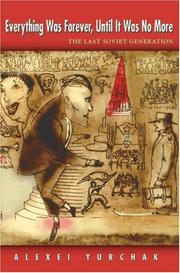| Listing 1 - 10 of 21 | << page >> |
Sort by
|
Book
ISBN: 0810164744 9780810164741 9780810126909 0810126907 Year: 2010 Publisher: Evanston, Ill. Northwestern University Press
Abstract | Keywords | Export | Availability | Bookmark
 Loading...
Loading...Choose an application
- Reference Manager
- EndNote
- RefWorks (Direct export to RefWorks)
Socialism and culture --- Consumption (Economics) --- Luxuries --- Leisure --- History --- Social aspects --- Europe, Eastern --- Social life and customs
Book
ISBN: 8024636891 9788024636894 9788024636627 Year: 2018 Publisher: Praha
Abstract | Keywords | Export | Availability | Bookmark
 Loading...
Loading...Choose an application
- Reference Manager
- EndNote
- RefWorks (Direct export to RefWorks)
Socialism and culture --- Soviet Union. --- Soviet Union --- Soviet Union --- Civilization. --- Intellectual life.
Book
ISBN: 1501735586 9781501735592 1501735594 9781501735585 9781501735578 Year: 2019 Publisher: Ithaca
Abstract | Keywords | Export | Availability | Bookmark
 Loading...
Loading...Choose an application
- Reference Manager
- EndNote
- RefWorks (Direct export to RefWorks)
The familiar story of Soviet power in Cold War Eastern Europe focuses on political repression and military force. But in Empire of Friends, Rachel Applebaum shows how the Soviet Union simultaneously promoted a policy of transnational friendship with its Eastern Bloc satellites to create a cohesive socialist world. This friendship project resulted in a new type of imperial control based on cross-border contacts between ordinary citizens. In a new and fascinating story of cultural diplomacy, interpersonal relations, and the trade of consumer-goods, Applebaum tracks the rise and fall of the friendship project in Czechoslovakia, as the country evolved after World War II from the Soviet Union's most loyal satellite to its most rebellious.Throughout Eastern Europe, the friendship project shaped the most intimate aspects of people's lives, influencing everything from what they wore to where they traveled to whom they married. Applebaum argues that in Czechoslovakia, socialist friendship was surprisingly durable, capable of surviving the ravages of Stalinism and the Soviet invasion that crushed the 1968 Prague Spring. Eventually, the project became so successful that it undermined the very alliance it was designed to support: as Soviets and Czechoslovaks got to know one another, they discovered important cultural and political differences that contradicted propaganda about a cohesive socialist world. Empire of Friends reveals that the sphere of everyday life was central to the construction of the transnational socialist system in Eastern Europe-and, ultimately, its collapse.
Socialism and culture --- Czechoslovakia --- Soviet Union --- Czechoslovakia --- Civilization --- Soviet influences. --- Relations --- Relations
Book
ISBN: 0739194488 0739191586 9780739191583 9780739191576 0739191578 9780739194485 Year: 2014 Publisher: Lanham, Maryland : Lexington Books,
Abstract | Keywords | Export | Availability | Bookmark
 Loading...
Loading...Choose an application
- Reference Manager
- EndNote
- RefWorks (Direct export to RefWorks)
Marxism and Urban Culture takes a broad view of Marx's legacy and-largely in the spirit of Marxist urban geographers Henri Lefebvre and David Harvey-applies that legacy to cultural practices and products from across the globe. Cities explored include Bologna, Buenos Aires, Guatemala City, Liverpool, London, Los Angeles, Madrid, Mahalla al-Kubra, Mexico City, Montreal, Osaka, Strasbourg, and Vienna.
Socialism and culture. --- City and town life. --- City life --- Town life --- Urban life --- Sociology, Urban --- Culture and socialism --- Culture
Book
ISBN: 9783110794465 Year: 2023 Publisher: Berlin Boston
Abstract | Keywords | Export | Availability | Bookmark
 Loading...
Loading...Choose an application
- Reference Manager
- EndNote
- RefWorks (Direct export to RefWorks)
Drawing on almost a decade of first-hand experience, Principles of Digital Democracy presents a unique look at digital democracy tools in action. Whether it is carbon budgeting in Canada, voting on legislation in Italy or policy consultation in Taiwan, this book explains not just what is possible to achieve with digital democracy tools today, but how to assess the life-cycle of civic engagement, as well as different approaches to security and policy implementation. Principles of Digital Democracy combines theory with practice, giving the reader an overarching theory of the components (Bestandteile) of digital democracy (e.g. ideation, deliberation, decision-making), as well as numerous case studies from around the world. Interviews with organizers and participants provide further insight into who participates in digital democracy and why they do so.
Socialism and culture. --- Democracy. --- Humanism. --- Communication --- Social aspects. --- Democratic Theory. --- Digital Engagement. --- Organizational Management. --- Public Engagement. --- Public Planning.
Book
ISBN: 9789004217270 9789004234512 9004234519 9004217274 Year: 2012 Volume: 42 *1 Publisher: Leiden ; Boston : Brill,
Abstract | Keywords | Export | Availability | Bookmark
 Loading...
Loading...Choose an application
- Reference Manager
- EndNote
- RefWorks (Direct export to RefWorks)
When the Hungarian Marxist philosopher and literary critic György Lukács returned to Hungary from Moscow after World War II, he engaged in a highly active phase of writing and speaking about the democratic culture needed to exorcise the remnants of fascism and to create the conditions for the advance of socialism in Central Europe. His essays of the period, including the influential volume Literature and Democracy , appear here for the first time in English translation. Engaged with questions of realist and modernist world-views in art, the relations of literary history to politics and social history, and the role of cultural intellectuals in public life, these essays offer a new look at one of the most influential Marxist thinkers of the twentieth century.
Political philosophy. Social philosophy --- Aesthetics --- Literature --- anno 1940-1949 --- Hungary --- Socialism and culture. --- Socialism and literature. --- PHILOSOPHY / History & Surveys / Modern --- Literature and socialism --- Culture and socialism --- Culture
Book
ISBN: 1800732287 9781800732285 9781800732278 Year: 2022 Publisher: New York : ©2022 Berghahn,
Abstract | Keywords | Export | Availability | Bookmark
 Loading...
Loading...Choose an application
- Reference Manager
- EndNote
- RefWorks (Direct export to RefWorks)
"How was heritage understood and implemented in European socialist states after World War II? By exploring national and regional specificities within the broader context of internationalization, this volume enriches the conceptual, methodological and empirical scope of heritage studies through a series of fascinating case studies. Its transnational approach highlights the socialist world's diverse interpretations of heritage and the ways in which they have shaped the trajectories of present-day preservation practices"
E-books --- Cultural property --- Socialism and culture --- Communism and culture --- Protection --- Political aspects --- Europe, Eastern --- Europe, Central --- Communist countries --- Cultural policy

ISBN: 0691121176 9780691121178 0691121168 9780691121161 1400849101 9781400849109 Year: 2006 Publisher: Princeton, NJ
Abstract | Keywords | Export | Availability | Bookmark
 Loading...
Loading...Choose an application
- Reference Manager
- EndNote
- RefWorks (Direct export to RefWorks)
Soviet socialism was based on paradoxes that were revealed by the peculiar experience of its collapse. To the people who lived in that system the collapse seemed both completely unexpected and completely unsurprising. At the moment of collapse it suddenly became obvious that Soviet life had always seemed simultaneously eternal and stagnating, vigorous and ailing, bleak and full of promise. Although these characteristics may appear mutually exclusive, in fact they were mutually constitutive. This book explores the paradoxes of Soviet life during the period of "late socialism" (1960s-1980s) through the eyes of the last Soviet generation. Focusing on the major transformation of the 1950s at the level of discourse, ideology, language, and ritual, Alexei Yurchak traces the emergence of multiple unanticipated meanings, communities, relations, ideals, and pursuits that this transformation subsequently enabled. His historical, anthropological, and linguistic analysis draws on rich ethnographic material from Late Socialism and the post-Soviet period. The model of Soviet socialism that emerges provides an alternative to binary accounts that describe that system as a dichotomy of official culture and unofficial culture, the state and the people, public self and private self, truth and lie--and ignore the crucial fact that, for many Soviet citizens, the fundamental values, ideals, and realities of socialism were genuinely important, although they routinely transgressed and reinterpreted the norms and rules of the socialist state.
#KVHA:Cultuurgeschiedenis Sovjet Unie --- Socialism and culture --- Soviet Union --- Civilization. --- Intellectual life. --- Culture and socialism --- Culture --- Intellectual life --- #KVHA:Cultuurgeschiedenis; Sovjet Unie --- Civilization --- Socialisme et culture --- URSS --- Civilisation --- Vie intellectuelle --- Socialism and culture - Soviet Union --- Soviet Union - Civilization --- Soviet Union - Intellectual life

ISBN: 1859732127 Year: 1999 Publisher: Oxford Berg
Abstract | Keywords | Export | Availability | Bookmark
 Loading...
Loading...Choose an application
- Reference Manager
- EndNote
- RefWorks (Direct export to RefWorks)
Sociology of environment --- Political philosophy. Social philosophy --- Sociology of culture --- Russian Federation --- Communism and architecture --- Communism and culture --- Material culture --- Social archaeology --- Architecture and society --- Socialism and culture --- Socialism --- History. --- History --- Russia
Book
ISBN: 1322504474 0801463211 080144991X 0801477387 080146322X 9780801463211 9780801449918 9780801477386 Year: 2011 Publisher: Ithaca Cornell University Press
Abstract | Keywords | Export | Availability | Bookmark
 Loading...
Loading...Choose an application
- Reference Manager
- EndNote
- RefWorks (Direct export to RefWorks)
Across the Soviet Bloc, from the 1960's until the collapse of communism, the automobile exemplified the tension between the ideological imperatives of political authorities and the aspirations of ordinary citizens. For the latter, the automobile was the ticket to personal freedom and a piece of the imagined consumer paradise of the West. For the authorities, the personal car was a private, mobile space that challenged the most basic assumptions of the collectivity. The "socialist car"-and the car culture that built up around it-was the result of an always unstable compromise between official ideology, available resources, and the desires of an increasingly restless citizenry. In The Socialist Car, eleven scholars from Europe and North America explore in vivid detail the interface between the motorcar and the state socialist countries of Eastern Europe, including the USSR. In addition to the metal, glass, upholstery, and plastic from which the Ladas, Dacias, Trabants, and other still extant but aging models were fabricated, the socialist car embodied East Europeans' longings and compromises, hopes and disappointments. The socialist car represented both aspirations of overcoming the technological gap between the capitalist first and socialist second worlds and dreams of enhancing personal mobility and status. Certain features of automobility-shortages and privileges, waiting lists and lack of readily available credit, the inadequacy of streets and highways-prevailed across the Soviet Bloc. In this collective history, the authors put aside both ridicule and nostalgia in the interest of trying to understand the socialist car in its own context.
Automobiles --- Automobile industry and trade --- Socialism and culture --- Culture and socialism --- Automotive industry --- Autos (Automobiles) --- Cars (Automobiles) --- Gasoline automobiles --- Motorcars (Automobiles) --- Social aspects --- History --- History. --- Culture --- Motor vehicle industry --- Motor vehicles --- Transportation, Automotive
| Listing 1 - 10 of 21 | << page >> |
Sort by
|

 Search
Search Feedback
Feedback About
About Help
Help News
News